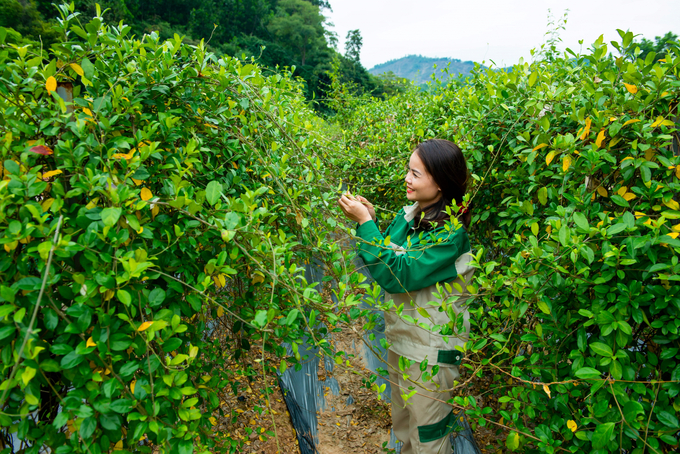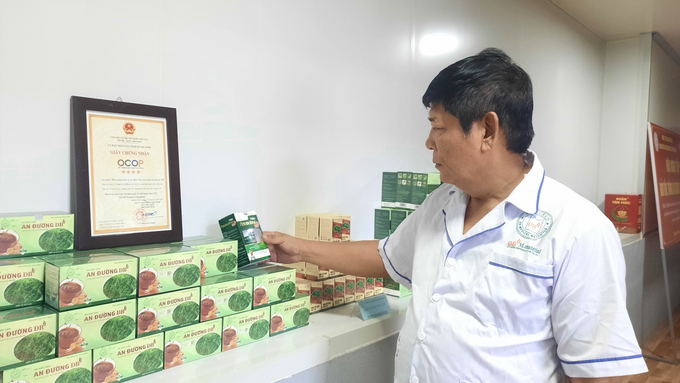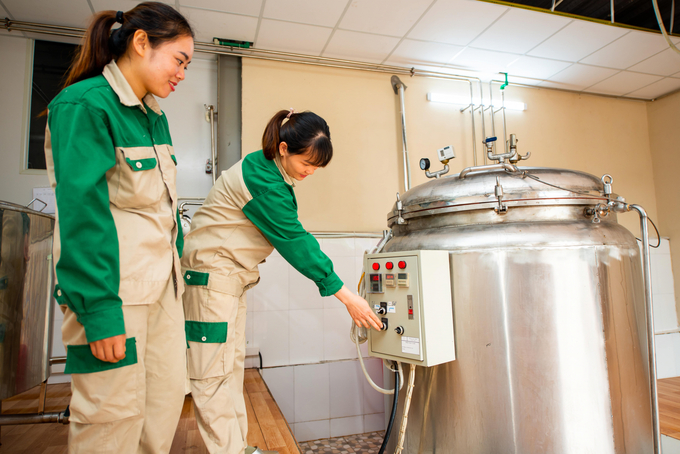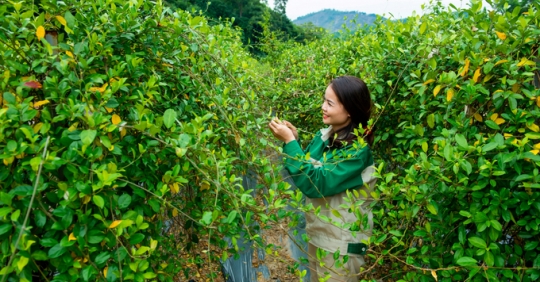
Quang Ninh aims to become a medical center in the Northeast region. Picture: Nguyen Thanh.
Potential to become a medical center in the Northeast region
Quang Ninh is considered a province with great potential for medicinal plants and has particularly favorable natural conditions for the cultivation and development of medicinal plants. Currently, the mine land is home to more than 900 species of medicinal plants belonging to 182 families and 561 different genera, many of which are valuable medicinal herbs with high economic value.
In addition to favorable climatic conditions and suitable soil for the growth of medicinal plants, Quang Ninh implements solutions to become a medical center of the northeastern provinces in particular and the country in general.
Since 2013, Quang Ninh Province has been implementing the One Community, One Product (OCOP Program) project, in which the development of medicinal herbs is carried out through this program.
To achieve the above goal, Quang Ninh Province has accelerated the development of planning medicinal plants in the region by 2020 with a vision by 2030.
The province has gradually expanded the area of medicinal plants in the region, applying policies with large incentives in terms of capital, varieties, science and technology … to create motivation and encourage units and companies to be bold scale models of Cultivation and processing of medicinal plants.
Typically, the model of planting and developing medicinal plants of Secoin Quang Ninh Joint Stock Company (Dong Trieu Town) specializes in the cultivation of turmeric, cloves, honeysuckle, Hoai Son, Diep Ha Chau, Crinum latifolium; Medicinal Plant Cultivation Model by Dong Son Green Technology Joint Stock Company (Ha Long City); Model of Dong Bac Medicinal Plantation, Production and Processing Co., Ltd (Cam Pha City).
In the process of development of production of medicinal herbs in the province, a number of models of unification of production, consumption and processing of medicinal herbs between producing households and cooperatives and enterprises have been formed. About 568 ha, the main crops are three sizes, Yellow Flower Tea.
Mr. Pham Viet Trung, director of Dong Bac Pharmaceutical Farming, Production and Processing Co., Ltd, assessed that the association, production, consumption and processing of medicinal herbs not only brings growers stable income, quiet production and expansion help on the development scale, but also help production facilities to obtain high-quality raw materials to meet increasing production demands. This is considered a prerequisite for the proliferation of medicinal plants throughout the province in the following years.

Mr. Pham Viet Trung presented 4 to 5 star herbal OCOP products. Picture: Nguyen Thanh.
Quang Ninh Province has also carried out activities to protect, conserve and assess the value of medicinal plant genetic resources, with a focus on endemic, valuable and endangered genetic resources. At the same time, set up production facilities for high-quality medicinal plant varieties; Medicinal plant protection gardens to sustainably preserve the genetic resources of rare and valuable medicinal plants.
The aim is to strive in the future to make Quang Ninh one of the most important centers in the country to supply medicinal herbs for domestic and foreign needs, towards export.
From the existing potential, Quang Ninh is expanding the planting area and expanding the dominant medicinal plants in the area. It is expected that in the period 2021 – 2025 the total area of medicinal plants will reach over 16,500 ha; in which over 7,000 ha of star anise, 2,170 ha of three halves, 1,500 ha of yellow tea and more than 2,100 ha of other medicinal plants are cultivated.
Deep processing for export
It can be said that the development of medicinal herb OCOP products is taking a new direction, bringing economic efficiency to enterprises and people of Quang Ninh.
According to statistics from the New Rural Coordination Office in Quang Ninh Province, there are 43 OCOP products made and processed from medicinal herbs in the province, of which 23 products have been awarded stars.
These products are increasingly chosen by people because of their closeness to nature, low toxicity and high therapeutic effect. At present, many places are developing OCOP products refined from medicinal herbs such as Ba Che, Binh Lieu, Tien Yen, Uong Bi, Hoanh Bo, Dong Trieu, Cam Pha.
In the first phase of the OCOP program in Quang Ninh, some preliminary processed medicines were still on the exhibition stands. Pre-processing and subsequent sale or sale of raw materials to partners is still common if the place is still developing raw material areas or because the production and processing capacity is not large.
Primary products of this type are mainly folk medicines, packaged medicinal herbs, medicinal alcohols, medicinal powders, lotions, etc. However, products that are pre-processed or sold with raw materials are not the priority of the manufacturing business units due to low profitability and low product competitiveness. According to calculations, the economic value of raw products is only 15-20% of the value of refined products.

The application of science and technology has increased the quality of OCOP drugs. Picture: Nguyen Thanh.
In the current period, the units have undergone a significant transformation and after the stabilization of the raw materials sector, they have systematically invested in technology, production lines and trading capacities. Therefore, pre-processed products have been gradually replaced by refined products with high-tech content, practicality and better quality.
In particular, more and more companies have made large-scale investments and methodical steps in cooperation to improve product quality, change production specifications, packaging labels, and the whole market. According to the latest survey, the production of OCOP medicinal herb products in units in Quang Ninh province has ensured a largely closed process. The company is proactive in the materials area and has a materials development strategy to ensure supply to production.
For example, Dong Bac Pharmaceutical Farming, Manufacturing and Processing Co., Ltd. the collaboration and pooling of expertise from the Institute of Medical Materials (Ministry of Health), the Pharmaceutical Science Joint Stock Company (Hanoi) and other leading experts at the University of Pharmacy, Academy of Ethnic Medicine. The company is also cooperating with households in Cam Pha city and neighboring districts in planting land.
Up to now, the company produces 40 products, including 8 products with OCOP 4-star rating, 2 products with 5-star OCOP nomination. Specifically, Dong Bac Jiao Co Lam Tea is one of Quang Ninh Province’s 27 Typical Agricultural Products in 2021. The products are highly appreciated and sold in domestic and overseas markets through channels such as online sales, stalls and supermarkets across the country.
In addition to the domestic market, market entry and expansion, and bringing OCOP products, including herbal products, to “overseas” is an open and promising direction. Recently, the trade promotion trip of the Quang Ninh delegation to the Laos market at the end of August 2022 sent many positive signals.
After this event, Northeast Medicinal Tea’s popular products, bavabi, apricot, three sizes, etc., which are popular, have the opportunity to restart after a long break because of the Covid-19 epidemic.
Besides Laos and Cambodia, trade promotion, access and market expansion activities for OCOP products were also carried out with the Chinese market before 2019. These are OCOP sponsorship programs at trade shows. ASEAN – China Trade, Vietnam – China International Tourism Trade Fair…
According to recent statistics, out of nearly 200 enterprises, cooperatives and institutions engaged in the production of OCOP products, there are more than 10 organizations and units producing OCOP medicinal herb products. These units produce about 30 medical OCOP products. Many of these nifty products are highly rated, with ratings between 3 and 4 stars.

